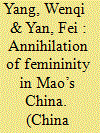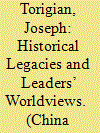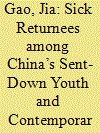| Srl | Item |
| 1 |
ID:
151967


|
|
|
|
|
| Summary/Abstract |
During the Chinese Cultural Revolution, Mao’s famous political slogan ‘The times have changed, men and women are the same’ (时代不同了, 男女都一样) asserted that men and women were equal in political consciousness and physical strength. However, the slogan’s seeming emphasis on gender equality misconstrued the concepts of equality and sameness. In-depth interviews with former ‘sent-down’ youth illustrate how state rhetoric appropriated a discourse of women’s equality to silence women and depoliticize gender as a political category. For urban sent-down youth, gender inequality was absent from public discourse, and conflict between the sexes was concealed by a state discourse that constructed class struggle as paramount. Gender as a category was credited with solely political and pragmatic meaning and was utilized as a means for the communist government to achieve its own political and cultural utopia.
|
|
|
|
|
|
|
|
|
|
|
|
|
|
|
|
| 2 |
ID:
162083


|
|
|
|
|
| Summary/Abstract |
Political scientists have found that early life experiences powerfully affect future leaders. Drawing on a variety of sources, this article investigates the formative role of Xi Jinping’s youth during a tumultuous time period in Chinese history. Xi’s life before and during the Cultural Revolution help explain his toughness, idealism, pragmatism, and caution. However, the evidence on how Xi’s childhood and young adulthood shaped his view on how to best handle political contradictions is ambiguous.
|
|
|
|
|
|
|
|
|
|
|
|
|
|
|
|
| 3 |
ID:
180007


|
|
|
|
|
| Summary/Abstract |
China’s first cohort of the sent-down youth during the Cultural Revolution has since its early years attracted considerable research interest and been analysed from a few different viewpoints. However, the gradual retreat from executing the sent-down policy, especially bingtui (return to urban centres of origin because of medical reasons) as the then widely used tactic, and its long-term impact on people’s socio-political attitudes and behaviours have not been examined and evaluated adequately. This has resulted in a large discrepancy between the non-academic discourse of returning sent-down youth, including bingtui, and the academic literature on these aspects in both Chinese and English. As revealed by many non-academic publications, bingtui not only represented the emergence of a widespread popular resistance to the Maoist Cultural Revolution that involved mobilising those who were then sent to the countryside, but was also believed to be responsible for a surge in what has since become known as songli feng (a wave of gift-giving practice). Based on the information recorded in published personal memories of many sent-down youth and other published accounts, online and print, as well as the information collected from my own past observations and recent interviews, this article will go beyond both glowing and condemnatory documentations of the sent-down movement of the late 1960s and 1970s and seek to analyse how bingtui was started, how it was utilised by sent-down youth and their families and, importantly, how it had led more Chinese people to realise that certain aspects of their identity could be performed.
|
|
|
|
|
|
|
|
|
|
|
|
|
|
|
|